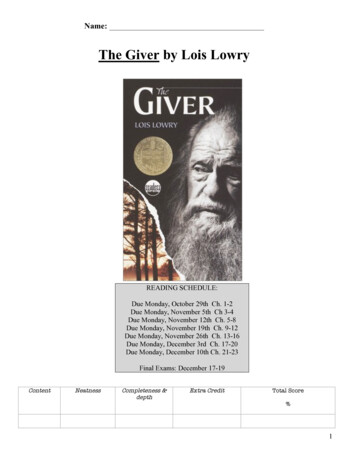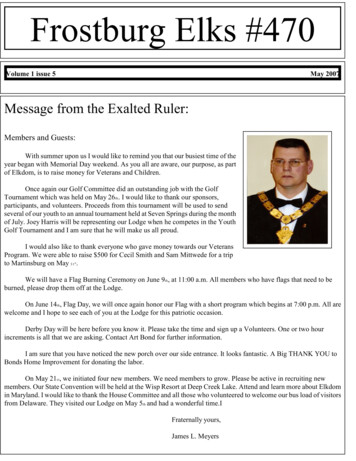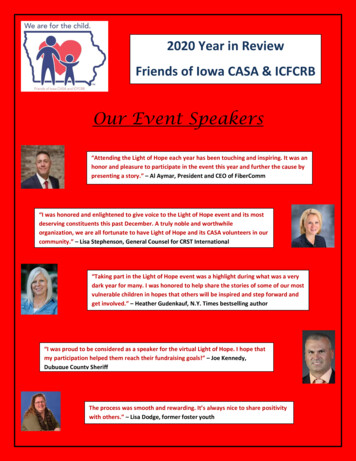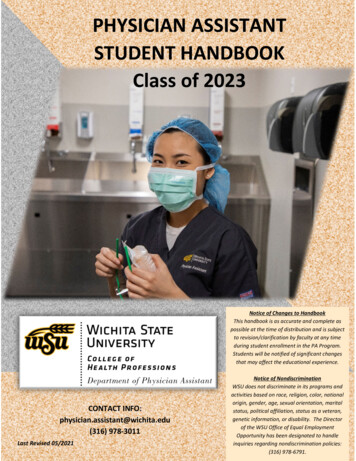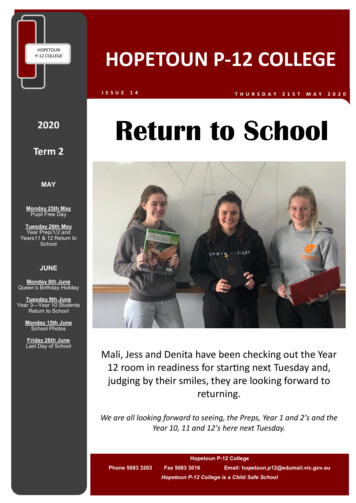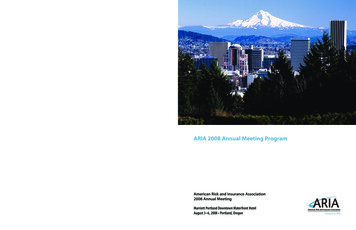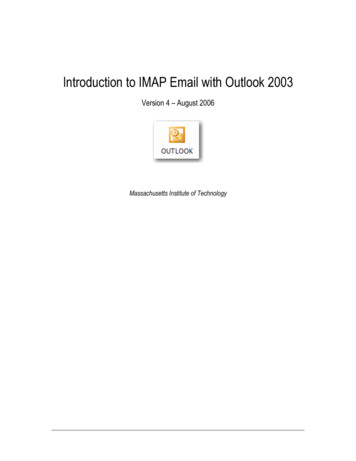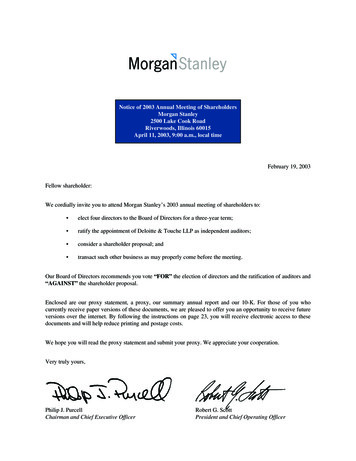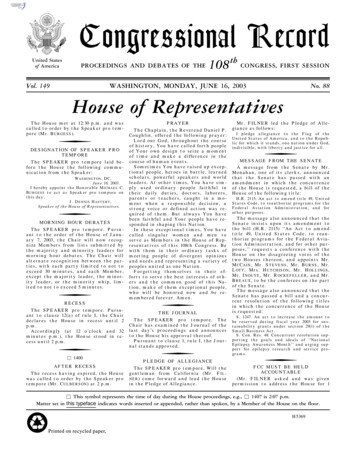
Transcription
URIBUUE PLNUCongressional RecordMSUnited Statesof AmericaPROCEEDINGS AND DEBATES OF THEVol. 149108 th CONGRESS, FIRST SESSIONWASHINGTON, MONDAY, JUNE 16, 2003No. 88House of RepresentativesThe House met at 12:30 p.m. and wascalled to order by the Speaker pro tempore (Mr. BURGESS).fDESIGNATION OF SPEAKER PROTEMPOREThe SPEAKER pro tempore laid before the House the following communication from the Speaker:WASHINGTON, DC,June 16, 2003.I hereby appoint the Honorable MICHAEL C.BURGESS to act as Speaker pro tempore onthis day.J. DENNIS HASTERT,Speaker of the House of Representatives.fMORNING HOUR DEBATESThe SPEAKER pro tempore. Pursuant to the order of the House of January 7, 2003, the Chair will now recognize Members from lists submitted bythe majority and minority leaders formorning hour debates. The Chair willalternate recognition between the parties, with each party limited to not toexceed 30 minutes, and each Member,except the majority leader, the minority leader, or the minority whip, limited to not to exceed 5 minutes.fRECESSThe SPEAKER pro tempore. Pursuant to clause 12(a) of rule I, the Chairdeclares the House in recess until 2p.m.Accordingly (at 12 o’clock and 32minutes p.m.), the House stood in recess until 2 p.m.fPRAYERThe Chaplain, the Reverend Daniel P.Coughlin, offered the following prayer:Lord our God, throughout the courseof history, You have called forth peopleof Your own design to seize a momentof time and make a difference in thecourse of human events.Sometimes You have raised up exceptional people, heroes in battle, learnedscholars, powerful speakers and worldleaders. At other times, You have simply used ordinary people faithful intheir daily duties, doctors, laborers,parents or teachers, caught in a moment when a responsible decision, astrong voice or defined action was required of them. But always You havebeen faithful and Your people have responded in shaping this Nation.In these exceptional times, You havecalled singular women and men toserve as Members in the House of Representatives of this 108th Congress. Bewith them in their ordinary tasks ofmeeting people of divergent opinionsand needs and representing a variety ofpeoples united as one Nation.Forgetting themselves in their efforts to serve the best interests of others and the common good of this Nation, make of them exceptional people,who will be honored now and be remembered forever. Amen.fTHE JOURNALThe SPEAKER pro tempore. TheChair has examined the Journal of thelast day’s proceedings and announcesto the House his approval thereof.Pursuant to clause 1, rule I, the Journal stands approved.fb 1400AFTER RECESSThe recess having expired, the Housewas called to order by the Speaker protempore (Mr. CULBERSON) at 2 p.m.PLEDGE OF ALLEGIANCEThe SPEAKER pro tempore. Will thegentleman from California (Mr. FILNER) come forward and lead the Housein the Pledge of Allegiance.Mr. FILNER led the Pledge of Allegiance as follows:I pledge allegiance to the Flag of theUnited States of America, and to the Republic for which it stands, one nation under God,indivisible, with liberty and justice for all.fMESSAGE FROM THE SENATEA message from the Senate by Mr.Monahan, one of its clerks, announcedthat the Senate has passed with anamendment in which the concurrenceof the House is requested, a bill of theHouse of the following title:H.R. 2115. An act to amend title 49, UnitedStates Code, to reauthorize programs for theFederal Aviation Administration, and forother purposes.The message also announced that theSenate insists upon its amendment tothe bill (H.R. 2115) ‘‘An Act to amendtitle 49, United States Code, to reauthorize programs for the Federal Aviation Administration, and for other purposes,’’ requests a conference with theHouse on the disagreeing votes of thetwo Houses thereon, and appoints Mr.MCCAIN, Mr. STEVENS, Mr. BURNS, Mr.LOTT, Mrs. HUTCHISON, Mr. HOLLINGS,Mr. INOUYE, Mr. ROCKEFELLER, and Mr.BREAUX, to be the conferees on the partof the Senate.The message also announced that theSenate has passed a bill and a concurrent resolution of the following titlesin which the concurrence of the Houseis requested:S. 1247. An act to increase the amount tobe reserved during fiscal year 2003 for sustainability grants under section 29(l) of theSmall Business Act.S. Con. Res. 48. Concurrent resolution supporting the goals and ideals of ‘‘NationalEpilepsy Awareness Month’’ and urging support for epilepsy research and service programs.fFCC MUST BE HELDACCOUNTABLE(Mr. FILNER asked and was givenpermission to address the House for 1b This symbol represents the time of day during the House proceedings, e.g., b 1407 is 2:07 p.m.Matter set in this typeface indicates words inserted or appended, rather than spoken, by a Member of the House on the floor.H5369.VerDate Jan 31 200305:03 Jun 17, 2003Jkt 019060PO 00000Frm 00001Fmt 7634Sfmt 0634E:\CR\FM\A16JN7.000H16PT1
H5370minute and to revise and extend his remarks.)Mr. FILNER. Mr. Speaker, I risetoday to express my concern and manyof our concerns over the regulatory uncertainty wrought by the recent Federal Communications Commission socalled triennial review decision. Infact, the FCC has made so many mistakes recently, I think that the initialstands for ‘‘Forget Consensus in Congress.’’In this case, the FCC missed the opportunity to bring clarity to the rulesthat promote facilities-based competition and would spur investment andcreate jobs. Instead, it has punted thedecision to the States, all 50 of them.This move will force more State proceedings, more regulatory uncertainly,and without a doubt, more delay.The telecommunications sector hascertainly had its meltdown. It has already lost more than half a millionjobs and 2 trillion in market value.And immediately after the Februarydecision, the industry lost a total capital value of 15 billion. Wall Streetcertainly took note and downgradedthe outlook for telecommunicationscompanies. With this regulation stranglehold, these companies cannot effectively recover from recent losses, theycannot invest in expansion, and theycannot create or save American jobs.As many recent decisions show, wemust hold the FCC more accountable.fHOUR OF MEETING ON TUESDAY,JUNE 17, 2003Mr. NETHERCUTT. Mr. Speaker, Iask unanimous consent that when theHouse adjourns today, it adjourn tomeet at 10:30 a.m. tomorrow for morning hour debates.The SPEAKER pro tempore. Is thereobjection to the request of the gentleman from Washington?There was no objection.fRECESSThe SPEAKER pro tempore. Pursuant to clause 12(a) of rule I, the Chairdeclares the House in recess until approximately 3 p.m. today.Accordingly (at 2 o’clock and 6 minutes p.m.), the House stood in recessuntil approximately 3 p.m.fb 1500AFTER RECESSThe recess having expired, the Housewas called to order by the Speaker protempore (Mr. CULBERSON) at 3 p.m.fANNOUNCEMENT BY THE SPEAKERPRO TEMPOREThe SPEAKER pro tempore. Pursuant to clause 8 of rule XX, the Chairwill postpone further proceedingstoday on motions to suspend the ruleson which a recorded vote or the yeasand nays are ordered, or on which theVerDate Jan 31 2003June 16, 2003CONGRESSIONAL RECORD — HOUSE01:57 Jun 17, 2003Jkt 019060vote is objected to under clause 6 ofrule XX.RECORD votes on postponed questionswill be taken after 6:30 p.m. today.fBRUCE WOODBURY POST OFFICEBUILDINGMr. CARTER. Mr. Speaker, I move tosuspend the rules and pass the bill(H.R. 2254) to designate the facility ofthe United States Postal Service located at 1101 Colorado Street in Boulder City, Nevada, as the ‘‘BruceWoodbury Post Office Building’’.The Clerk read as follows:H.R. 2254Be it enacted by the Senate and House of Representatives of the United States of America inCongress assembled,SECTION 1. BRUCE WOODBURY POST OFFICEBUILDING.(a) DESIGNATION.—The facility of theUnited States Postal Service located at 1101Colorado Street in Boulder City, Nevada,shall be known and designated as the ‘‘BruceWoodbury Post Office Building’’.(b) REFERENCES.—Any reference in a law,map, regulation, document, paper, or otherrecord of the United States to the facility referred to in subsection (a) shall be deemed tobe a reference to the Bruce Woodbury PostOffice Building.The SPEAKER pro tempore. Pursuant to the rule, the gentleman fromTexas (Mr. CARTER) and the gentlemanfrom Illinois (Mr. DAVIS) each will control 20 minutes.The Chair recognizes the gentlemanfrom Texas (Mr. CARTER).GENERAL LEAVEMr. CARTER. Mr. Speaker, I askunanimous consent that all Membersmay have 5 legislative days withinwhich to revise and extend their remarks on the bill currently under consideration.The SPEAKER pro tempore. Is thereobjection to the request of the gentleman from Texas?There was no objection.Mr. CARTER. Mr. Speaker, I yieldmyself such time as I may consume.Mr. Speaker, H.R. 2254, introduced bymy distinguished colleague, the gentleman from the State of Nevada (Mr.PORTER), designates the facility of theUnited States Postal Service located at1101 Colorado Street in Boulder City,Nevada, as the ‘‘Bruce Woodbury PostOffice Building.’’Mr. Speaker, this legislation honorsa public servant whose contributionsmay not garner national attention; butin southern Nevada, few citizens aremore highly regarded than BruceWoodbury.To those who live in and around theThird Congressional District of Nevada, Bruce Woodbury is known as acivic official who has been among themost influential in promoting the remarkable economic development ofthis booming region. He has chairedthe Regional Transportation Commission of Southern Nevada for the last 11years. In that capacity, his crowningachievement was securing the construction of the Las Vegas Beltway,PO 00000Frm 00002Fmt 7634Sfmt 0634probably the most ambitious transportation project ever in Clark County.Bruce Woodbury also has served onthe Clark County Commission insouthern Nevada for 21 years. Mr.Woodbury has led this commission onthe most important issues Clark County has had to face: health care, air andwater quality, public transit, gaming,sanitation, and many others. His fellowcommissioners have selected him to bethe Chair of the Big Ben Water DistrictBoard of Trustees, the vice-chair of theKyle Canyon Water District Board ofTrustees, among several other posts.Mr. Woodbury is also a partner at hislaw firm of Jolley, Urga, Wirth andWoodbury that has offices in BoulderCity and in Las Vegas.In his time away from work, he isalso a member of the Boulder CityChamber of Commerce, Rotary Club,and Elks Lodge. Previously he has saton the board of trustees at a bank, theLas Vegas chapter of the Red Cross,and the Nevada Special Olympics. Finally, he has been appointed to manystate level councils, boards, and otherpanels, truly too numerous to name.In whatever spare time that he canfind, Mr. Woodbury loves to spend asmuch time as he can with his wife,Rose, and their seven children, Adam,Ashley, Benjamin, Melissa, Rebecca,Rodney and Wendy, and their sevengrandchildren: Anna, Elias, Jess, Joseph, Samuel, and Silvie Jane.I understand that the gentlemanfrom Nevada, the sponsor of this legislation and former mayor of BoulderCity, has worked together with BruceWoodbury on countless efforts affecting the residents of southern Nevada.They have developed a close relationship, and I applaud my colleague fromNevada for his work on this meaningfulmeasure. This post office in BoulderCity, Nevada will hopefully soon benamed after a truly wonderful, allaround American.Therefore, I urge all Members to support the passage of H.R. 2254.Mr. Speaker, I reserve the balance ofmy time.Mr. DAVIS of Illinois. Mr. Speaker, Iyield myself such time as I may consume.Mr. Speaker, as a member of theHouse Committee on Government Reform, I am pleased to join my colleaguein consideration of H.R. 2254, whichnames a postal facility in Boulder City,Nevada, after Bruce Woodbury.H.R. 2254, which was introduced bythe gentleman from Nevada (Mr. PORTER) on May 22, 2003, has met the committee policy and has been cosponsoredby all members of the Nevada delegation.Mr. Woodbury is a native of LasVegas, Nevada, and has lived in Boulder City for over 25 years. A distinguished community and civic-mindedmember of Boulder City, Mr. Woodburyhas long been involved in city politics.As a member of the Clark County Commission for 21 years and the 7.004H16PT1
June 16, 2003Woodbury has successfully tackled anumber of challenging transportationprojects.As chairman of the Regional Transportation Committee, CommissionerWoodbury was a driving force behindthe construction of the Las Vegas Beltway and reducing traffic delays.I commend my colleague for seekingto honor the numerous contributions ofCommissioner Bruce Woodbury in thismanner. I note that H.R. 2254 also enjoys the support of the Honorable Robert S. Ferraro, mayor of Boulder City,and members of the entire city council.Mr. Speaker, I certainly concur inthe passage of this bill.Mr. Speaker, I have no further speakers, and I yield back the balance of mytime.Mr. CARTER. Mr. Speaker, I yieldsuch time as he may consume to thehonorable gentleman from the State ofNevada (Mr. PORTER), the sponsor ofthis legislation.Mr. PORTER. Mr. Speaker, I risetoday in support of H.R. 2254, legislation to name the United States PostalService facility in Boulder City, Nevada, in honor of Clark County Commissioner Bruce Woodbury.I introduced this legislation to paytribute to one of southern Nevada’smost distinguished citizens. I haveworked closely with the members ofthe city council of Boulder City andthe mayor of Boulder City, Robert Ferraro, to appropriately thank Commissioner Woodbury for his many contributions to the great State of Nevadaand to our Nation.Commissioner Woodbury is a nativeof Las Vegas and has resided in BoulderCity, Nevada, since 1978. He is a graduate of Las Vegas High School and attended the University of Utah where hegraduated Phi Kappa Phi, Phi BetaKappa, and Magna Cum Laude. Mr.Woodbury then attended StanfordSchool of Law where he earned a Doctor of Jurisprudence and was a memberof the Board of Editors of the StanfordLaw Review.In southern Nevada, CommissionerWoodbury has been active for manyyears as an outstanding civic leader.He has served as a member of the ClarkCounty Commission for 21 years and onthe Regional Transportation Commission of southern Nevada for 17 years,the last 11 as that body’s chairman. Hewas also the founding father of theClark County Regional Flood Districtand the Southern Nevada Water Authority.Mr. Speaker, the impact and themagnitude of his contributions areseen by Nevadans every day. Commissioner Woodbury was instrumental ingathering support for the constructionof the Las Vegas Beltway, the largestand most visible transportation projectever undertaken in Clark County’s history. Through his leadership, Commissioner Woodbury has worked to minimize traffic delays, reduce inconvenience for drivers, and maintain accessto local businesses. In addition, Mr.VerDate Jan 31 200301:57 Jun 17, 2003H5371CONGRESSIONAL RECORD — HOUSEJkt 019060Woodbury has been very involved inlocal, civic, and youth organizationsand is a proud father and grandfather.It has been my privilege to work withCommissioner Woodbury on a varietyof projects; and I can speak to his character as a leader, as a citizen, and as afriend.Mr. Speaker, on a personal note,Bruce Woodbury is a quiet man. He actually was very embarrassed when Isuggested we name the post office afterhim. Bruce does not like accolades. Heis the first, the first man to give everyone else credit before taking credit forhimself. Yes, he is quiet; but he is aneffective leader, and he is one of themost visionary and caring individualswho has ever served as a public servant. His example sets the standard forall of us serving this great country.Southern Nevada has grown almostthreefold since Mr. Woodbury waselected, to almost 1.6 million people.There is not a project in Nevada thatMr. Woodbury has not touched, whether it be transportation, air quality,schools, health care, water quality,senior citizens, and taking care of ourchildren.As a matter of fact, when Bruce wasfirst elected over 20 years ago, therewas a major flood in southern Nevada.Bruce was there with a shovel helpingcitizens dig out their cars, their homes,their livestock, making sure they couldget their families back in order. Brucedid not just sit back; Bruce thenformed the Clark County Flood ControlDistrict. We have not had the samechallenges that we had in 20 years because of Bruce Woodbury’s leadership.Let us talk about traffic for a second.Bruce travels to work about 20 milesevery day and got tired of sittingaround in traffic and decided to buildand be the leader in developing the LasVegas Beltway, because Bruce, although quiet, is effective and wantedto get the job done.Mr. Speaker, as a Member of thisbody, I am truly honored to haveserved with Mr. Woodbury. He has beena mentor for me and many other publicservants, and words truly cannot express my appreciation for all that hehas done to improve the quality of lifein Nevada.I urge all of the Members of this bodyto support the legislation today.Mr. CARTER. Mr. Speaker, I have noother speakers at this time. Again, Iwant to thank my colleague, the gentleman from Nevada, for introducingthis important legislation; and I thankthe gentleman from Illinois as well. Iurge all Members to support the passage of this legislation.Mr. Speaker, I yield back the balanceof my time.The SPEAKER pro tempore. Thequestion is on the motion offered bythe gentleman from Texas (Mr.CARTER) that the House suspend therules and pass the bill, H.R. 2254.The question was taken.The SPEAKER pro tempore. In theopinion of the Chair, two-thirds ofPO 00000Frm 00003Fmt 7634Sfmt 0634those present have voted in the affirmative.Mr. CARTER. Mr. Speaker, on that Idemand the yeas and nays.The yeas and nays were ordered.The SPEAKER pro tempore. Pursuant to clause 8 of rule XX and theChair’s prior announcement, furtherproceedings on this motion will bepostponed.fCOMMENDINGMEDGARWILEYEVERS AND MYRLIE EVERS-WILLIAMS FOR THEIR LIVES ANDACCOMPLISHMENTSMr. CARTER. Mr. Speaker, I move tosuspend the rules and agree to the concurrent resolution (H. Con. Res. 220)commending Medgar Wiley Evers andhis widow, Myrlie Evers-Williams, fortheir lives and accomplishments.The Clerk read as follows:H. CON. RES. 220Whereas a pioneer in the fight for racialjustice, Medgar Wiley Evers, was born July2, 1925, in Decatur, Mississippi, to James andJessie Evers;Whereas, to faithfully serve his country,Medgar Evers left high school to join theArmy when World War II began and, aftercoming home to Mississippi, he completedhigh school, enrolled in Alcorn Agriculturaland Mechanical College, presently known asAlcorn State University, and majored inbusiness administration;Whereas, as a student at Alcorn Agricultural and Mechanical College, Evers was amember of the debate team, the collegechoir, and the football and track teams, wasthe editor of the campus newspaper and theyearbook, and held several student offices,which gained him recognition in Who’s Whoin American Colleges;Whereas, while a junior at Alcorn Agricultural and Mechanical College, Evers met afreshman named Myrlie Beasley, whom hemarried on December 24, 1951, and withwhom he spent the remainder of his life;Whereas, after Medgar Evers received abachelor of arts degree, he moved to historicMound Bayou, Mississippi, became employedby Magnolia Mutual Life Insurance Company, and soon began establishing localchapters of the National Association for theAdvancement of Colored People (referred toin this resolution as the ‘‘NAACP’’) throughout the Delta region;Whereas, moved by the plight of AfricanAmericans in Mississippi and a desire tochange the conditions facing them, in 1954,after the United States Supreme Court ruledschool segregation unconstitutional, MedgarEvers became the first known African-American person to apply for admission to theUniversity of Mississippi Law School, butwas denied that admission;Whereas, as a result of that denial, MedgarEvers contacted the NAACP to take legal action;Whereas, in 1954, Medgar Evers was offereda position as the Mississippi Field Secretaryfor the NAACP, and he accepted the position,making Myrlie Evers his secretary;Whereas, with his wife by his side, MedgarEvers began a movement to register peopleto vote in Mississippi and, as a result of hisactivities, he received numerous threats;Whereas, in spite of the threats, MedgarEvers persisted, with dedication and courage,to organize rallies, build the NAACP’s membership, and travel around the country withMyrlie Evers to educate the public;Whereas Medgar Evers’ passion for qualityeducation for all children led him to file suitE:\CR\FM\K16JN7.007H16PT1
H5372against the Jackson, Mississippi publicschools, which gained him national mediacoverage;Whereas Medgar Evers organized studentsfrom Tougaloo and Campbell Colleges, coordinated and led protest marches, organizedboycotts of Jackson businesses and sit-ins,and challenged segregated bus seating, andfor these heroic efforts, he was arrested,beaten, and jailed;Whereas the violence against Medgar Everscame to a climax on June 12, 1963, when hewas shot and killed in front of his home;Whereas, after the fingerprints of an outspoken segregationist were recovered fromthe scene of the shooting, and 2 juries deadlocked without a conviction in the shootingcase, Myrlie Evers and her 3 children movedto Claremont, California, where she enrolledin Pomona College and earned her bachelor’sdegree in sociology in 1968;Whereas, after Medgar Evers’ death, MyrlieEvers began to create her own legacy andemerged as a national catalyst for justiceand equality by becoming active in politics,becoming a founder of the National Women’sPolitical Caucus, running for Congress inCalifornia’s 24th congressional district, serving as Commissioner of Public Works for LosAngeles, using her writing skills to serve asa correspondent for Ladies Home Journaland to cover the Paris Peace Talks, and rising to prominence as Director of ConsumerAffairs for the Atlantic Richfield Company;Whereas Myrlie Evers became MyrlieEvers-Williams when she married WalterWilliams in 1976;Whereas, in the 1990’s, Evers-Williams convinced Mississippi prosecutors to reopenMedgar Evers’ murder case, and the reopening of the case led to the conviction and lifeimprisonment of Medgar Evers’ killer;Whereas Evers-Williams became the firstfemale to chair the 64-member Board of Directors of the NAACP, to provide guidance toan organization that was dear to MedgarEvers’ heart;Whereas Evers-Williams has published hermemoirs, entitled ‘‘Watch Me Fly: What ILearned on the Way to Becoming the WomanI Was Meant to Be’’, to enlighten the worldabout the struggles that plagued her life asthe wife of an activist and empowered her tobecome a community leader;Whereas Evers-Williams is widely knownas a motivational lecturer and continues tospeak out against discrimination and injustice;Whereas her latest endeavor has broughther home to Mississippi to make two remarkable contributions, through the establishment of the Evers Collection and theMedgar Evers Institute, which advance theknowledge and cause of social injustice andwhich encompass the many lessons in thelife’s work of Medgar Evers and MyrlieEvers-Williams;Whereas Evers-Williams has presented theextraordinary papers in that Collection andInstitute to the Mississippi Department ofArchives and History, where the papers arebeing preserved and catalogued; andWhereas it is the policy of Congress to recognize and pay tribute to the lives and accomplishments of extraordinary Mississippians such as Medgar Evers and MyrlieEvers-Williams, whose life sacrifices havecontributed to the betterment of the lives ofthe citizens of Mississippi as well as theUnited States: Now, therefore, be itResolved by the House of Representatives (theSenate concurring), That—(1) Congress commends Medgar WileyEvers and his widow, Myrlie Evers-Williams,and expresses the greatest respect and gratitude of Congress, for their lives and accomplishments;VerDate Jan 31 2003June 16, 2003CONGRESSIONAL RECORD — HOUSE01:57 Jun 17, 2003Jkt 019060(2) Congress supports the establishment ofa ‘‘Medgar Evers National Week of Remembrance’’; and(3) copies of this resolution shall be furnished to the family of Medgar Wiley Eversand Myrlie Evers-Williams.The SPEAKER pro tempore. Pursuant to the rule, the gentleman fromTexas (Mr. CARTER) and the gentlemanfrom Illinois (Mr. DAVIS) each will control 20 minutes.The Chair recognizes the gentlemanfrom Texas (Mr. CARTER).GENERAL LEAVEMr. CARTER. Mr. Speaker, I askunanimous consent that all Membersmay have 5 legislative days withinwhich to revise and extend their remarks on the concurrent resolutioncurrently being considered.The SPEAKER pro tempore. Is thereobjection to the request of the gentleman from Texas?There was no objection.Mr. CARTER. Mr. Speaker, I yieldmyself such time as I may consume.Mr. Speaker, House Concurrent Resolution 220, introduced by my distinguished colleague, the gentleman fromthe State of Mississippi (Mr. THOMPSON), commends Medgar Wiley Eversand his widow, Myrlie Evers-Williamsfor their lives and accomplishments. Iam proud that this House is considering this legislation, because it canserve as an important history lesson toall of those who witness these proceedings here today.Mr. Speaker, as legislative businessbegan this afternoon, we recited thePledge of Allegiance on this floor as wedo every day. But today it seems especially appropriate to revisit that vowjust before this House honors a manand a woman who have lived their livesbased on the belief that in this country, more than anywhere else in theworld, there should surely be ‘‘libertyand justice for all.’’b 1515Mr. Speaker, Medgar Evers andMyrlie Evers-Williams are each remarkable civil rights leaders who haveaccomplished great deeds on behalf ofcountless Americans.Medgar was born in Decatur, Mississippi, in 1925. He dropped out of highschool at the age of 17 to join the Armyduring World War II. When he safely returned home, he completed high schooland went on to attend and graduatefrom Alcorn A&M College. He landed ajob with an insurance agency before becoming a field secretary to the National Association for the Advancement of Colored People in Jackson,Mississippi.Medgar soon met a young Mississippiwoman named Myrlie who also workedfor the NAACP, and they married in1951. Tragically, 12 years later, MedgarEvers was dreadfully shot and killedoutside his home.Despite this unbelievable heartbreak,Myrlie Evers-Williams has carried on.She soon moved to Claremont, California, with her three children to beginPO 00000Frm 00004Fmt 7634Sfmt 0634a new life. Among her many subsequent accomplishments Ms. Evers-Williams became the first black woman toserve on the Los Angeles Board of Public Works where she oversaw nearly6,000 public employees and a budget of 400 million. In addition, she was thefirst woman elected to chair theNAACP in 1995 and continues to be avaluable asset to the association aschairman emeritus.Mr. Speaker, I want to remind thisHouse that last Thursday was the 40thanniversary of the tragic assassinationof Medgar Evers that occurred on June12, 1963. Early this afternoon, a national day of remembrance was observed at Medgar Evers’ grave site inArlington National Cemetery. Thissober and beautiful event marked theend of the Medgar Evers National Weekof Remembrance organized by theMedgar Evers Institute founded lastyear by Myrlie Evers-Williams. Theweek featured events across the Stateof Mississippi, including celebration ofhis life in Newton, a prayer and candlelight vigil in Jackson, and a symposium on his works and achievements inTougaloo.Mr. Speaker, for all these reasons, Iurge all Members to support the adoption of House Concurrent Resolution220 that honors the lives of these twofine people, Medgar Wiley Evers andMyrlie Evers-Williams. I sincerelythank my colleague from Mississippifor introducing this important resolution.Mr. Speaker, I reserve the balance ofmy time.Mr. DAVIS of Illinois. Mr. Speaker, Iyield myself such time as I might consume.I want to thank the gentleman fromTexas for his remarks, and I ampleased to join with him as we considerH. Con. Res. 220, a bill commendingMedgar Wiley Evers and his widowMyrlie Evers-Williams for their livesand accomplishments.Mr. Speaker, on June 12, 1963, a blackcivil rights activist was murdered infront of his home and became a martyrfor the cause. On that same day, thatvery same day, his wife became evenmore committed to the cause and tothe work that they were doing.Medgar Wiley Evers was born July 2,1925, near Decatur, Mississippi, and attended school there until he was inducted into the Army in 1943. Afterserving in Normandy, France, he attended Alcorn College, where he metMyrlie Beasley of Vicksburg, Mississippi. They were married the nextyear on December 14, 1951.After receiving his degree, MedgarEvers moved to Mound Bayou, Mississippi, during which time he began toestablish local chapters of the NAACPthroughout the Delta and organizingboycotts of gasoline stations that refused to allow blacks to use their restrooms.He worked in Mound Bayou as an insurance agent until 1954, the year a Supreme Court decision ruled school desegregation unconstitutional. DespiteE:\CR\FM\A16JN7.002H16PT1
June 16, 2003the Court’s rulings, Evers applied forand was denied admission to the University of Mississippi Law School. Hisactions caught the attention of theNAACP’s national office, and he wasappointed Mississippi’s first field secretary for the NAACP.Medgar and Myrlie moved to Jacksonwhere they worked together to set upthe NAACP office, began to investigateviolent crimes committed againstblacks and rallied civil rights demonstrators and organized voter registration drives.On June 12, 1963, a few hours afterPresident Kennedy had made an extrao
House of the following title: H.R. 2115. An act to amend title 49, United States Code, to reauthorize programs for the Federal Aviation Administration, and for . effect Myrlie Evers-Williams has had as a na-tional leader for all African Americans is a leg-acy to be cherished. An on-line search for ''Medgar Evers'' re-turns 29,600 .
